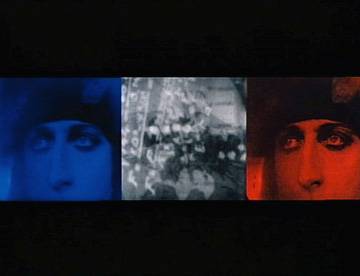
Every once in a while I like to open this column to a discussion of classic films which, for one reason or another, have not yet found their way onto the DVD format, or at least Region 1 (American) DVD. This week I’d like to focus on Abel Gance’s 1927 film Napoleon, which I “discovered” (actually, “located after being instructed to watch”) recently in the tiny VHS corner of your favorite local video store.
First it should be observed that 1927 was a year, for whatever reason, of amazing creative output in cinema around the world. It was for silent cinema what 1922 was for modernist fiction, as a frame of reference for my fellow pretentious students of literature. The year 1927 produced the likes of F.W. Murnau’s Sunrise, Buster Keaton’s The General, Alfred Hitchcock’s The Lodger, Fritz Lang’s Metropolis, Josef von Sternberg’s Underworld (which I know only by reputation — it’s another that begs a DVD release), Walter Ruttman’s Berlin: Symphony of a Great City, and if we want to cheat a little, C.T. Dreyer’s The Passion of Joan of Arc (released in early 1928), all of which would easily qualify as a top-200 film of all time, had I my way. Abel Gance’s contribution to this multi-national brilliance soup belongs up with the best of them, as one of the most formally advanced and experimental films of the bunch.
Napoleon is an unabashedly nationalistic French epic concerning the first 30 years of the life of the Corsican despot. Despite its relatively narrow sampling of Emporer Bonaparte’s lifetime, the film is nearly four hours long, epic in length and ambition. Gance ends his film with the beginning of the Italian campaign, the first step of Napoleon’s conquest of continental Europe. The climax is what the film is primarily remembered for; Gance devised a type of proto-Panavision using three cameras at once. This cinematic triptych combined to form the medium’s first “widescreen,” though it required three separate screens to be viewed properly. Gance also edits within each frame during the climax, using the form both for extreme widescreen shots (4:1 as opposed to today’s common 2.35:1) and a more dynamic composition, the latter accomplished often by mirroring identical shots on the right and left to frame the image in the middle.
The sequence of the triptych wasn’t Gance’s only widely experimental way of presenting his fusion of personal and nationalist narratives. In-camera effects such as superimpositions (sometimes four to five in a single shot), evoking either thematic motifs or character psychology, are prevalent, as are wild camera movements and a quick editing style reminiscent of Russian montage — this isn’t you’re father’s historical epic. It’s actually your great-grandfather’s. But you know what I mean.
Napoleon was released on VHS and Laser Disc by Francis Ford Coppola’s American Zoetrope after its reconstruction in 1986, with a beautiful original score by Coppola’s brother, Carmine. This remains its only release on home video; it’s time for a definitive DVD edition, in this writer’s opinion.
New Releases From the Box
Religulous
Bill Maher may be the left’s answer to Dennis Miller, but unfortunately this means that Maher is every bit as smug and obnoxious as the right’s only funny comedian (the only other Republican comedians which come to mind being Adam Sandler and Drew Carey). Fortunately, Maher is still quick-witted and funny, making Religulous‘ best moments hilarious, incisive swipes at America’s dominant religion, Protestant Christianity. Unfortunately, the film’s shining moments are for the most part outweighed by the imagined immediacy of the film’s unoriginal argument (“religion is bad, m’kay?”) and an oddly placed bigotry against Islam. While Maher goes relatively easy on Catholics and Jews — surely it is no coincidence that his father was Catholic and his mother Jewish — portraying the former as reformed demagogues and the latter as quaintly insane, he is quick to insist to all the Muslims he interviews that Islam is inherently violent. Using Michael Moore-esque individual, atypical incidents and unscientific observations and analyses, the section of the film covering Islam is irredeemably one-sided and, moreover, unfunny. Overall, Religulous provides few laughs in exchange for an irrational argument and an essentially bigoted worldview, exposing Maher to be what he probably detests most: an anti-intellectual reactionary.
Changeling
Angelina Jolie is nominated for an Oscar for the first of director Clint Eastwood’s one-two 2008 filmmaking punch. Jolie plays a real-life homely woman (ahem) whose son disappeared under mysterious circumstances. Think Flightplan on a train, several decades earlier.
Body of Lies
Ridley Scott and Russell Crowe team up for the upteenth time for this spy thriller; Crowe gets fat again. Might be worth a watch if you’re in the mood for a mediocre spy thriller. (I swear I get in that mood sometimes.)
High School Musical 3: Senior Year
Two beautiful teens break up and get back together for the third year in a row. The popular girl is evil again even after being redeemed two years in a row, only to be redeemed again by the end of the film. Her brother, The Gay One, still doesn’t come out because Disney is too nervous to be honest, but they’re OK with implication and stereotypes. The black couple get a song or two, remaining happy at the margins. And I haven’t even seen this one yet.
Next Week on From the Box
Facets releases another from the director of Bashing, Man Walking on Snow. Our author may get a chance to watch and review it; if not, he will sort through the myriad other films coming out and try to say something about them.








